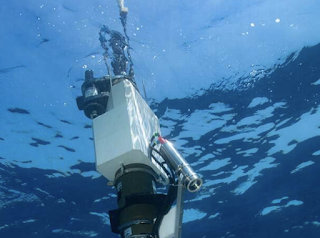Past Sea Save writer speaks out, Antarctica temperatures soar past 20C for first time, Oil production in the US exceeds one billion barrels yet BP aims to be carbon neutral by 2050 and more…
 In the blink of a geological eye, more than 50% of the world’s coral reefs have disappeared — wiped out by factors like warming waters, pollution and overfishing — all within the past few decades. That in itself is disturbing, but new research reveals an even more distressing finding: virtually all of the coral reef habitat on Earth is likely to vanish by the end of this century. “By 2100, it’s looking quite grim,” said Renee Setter, a past Communications Director at Sea Save and currently a biogeographer at the University of Hawaii Manoa. She presented the new findings at a conference on ocean sciences this week.
In the blink of a geological eye, more than 50% of the world’s coral reefs have disappeared — wiped out by factors like warming waters, pollution and overfishing — all within the past few decades. That in itself is disturbing, but new research reveals an even more distressing finding: virtually all of the coral reef habitat on Earth is likely to vanish by the end of this century. “By 2100, it’s looking quite grim,” said Renee Setter, a past Communications Director at Sea Save and currently a biogeographer at the University of Hawaii Manoa. She presented the new findings at a conference on ocean sciences this week.
 The Antarctic has registered a temperature of more than 20C (68F) for the first time on record, prompting fears of climate instability in the world’s greatest repository of ice. The 20.75C logged by Brazilian scientists at Seymour Island on 9 February was almost a full degree higher than the previous record of 19.8C, taken on Signy Island in January 1982. It follows another recent temperature record: on 6 February an Argentinian research station at Esperanza measured 18.3C, which was the highest reading on the continental Antarctic peninsula.
The Antarctic has registered a temperature of more than 20C (68F) for the first time on record, prompting fears of climate instability in the world’s greatest repository of ice. The 20.75C logged by Brazilian scientists at Seymour Island on 9 February was almost a full degree higher than the previous record of 19.8C, taken on Signy Island in January 1982. It follows another recent temperature record: on 6 February an Argentinian research station at Esperanza measured 18.3C, which was the highest reading on the continental Antarctic peninsula.

Oil giant BP on Wednesday announced its intention to be carbon neutral by 2050. “The world’s carbon budget is finite and running out fast; we need a rapid transition to net-zero. We all want energy that is reliable and affordable, but that is no longer enough,” CEO Bernard Looney said in a statement. “It must also be cleaner,” he added. “To deliver that, trillions of dollars will need to be invested in replumbing and rewiring the world’s energy system. It will require nothing short of reimagining energy as we know it.”
 U.S. oil production on public lands hit more than 1 billion barrels last year, a nearly 30 percent increase overproduction at the end of the Obama administration. The billion-barrel figure for fiscal 2019 is the highest the Department of the Interior has seen over the last decade. Interior, which manages public lands, credited executive orders from President Trump calling for energy independence and greater offshore drilling for creating “a blueprint for the Department” and helping to speed permitting.
U.S. oil production on public lands hit more than 1 billion barrels last year, a nearly 30 percent increase overproduction at the end of the Obama administration. The billion-barrel figure for fiscal 2019 is the highest the Department of the Interior has seen over the last decade. Interior, which manages public lands, credited executive orders from President Trump calling for energy independence and greater offshore drilling for creating “a blueprint for the Department” and helping to speed permitting.
5. The Antarctica Factor: Model uncertainties reveal upcoming sea-level risk
 Within this century already, due to Antarctica alone, global sea level might rise up to three times as much as it did in the last century. This is a finding of an exceptionally comprehensive comparison of state-of-the-art computer models from around the world. “The ‘Antarctica Factor’ turns out to be the greatest risk, and also the greatest uncertainty, for sea-levels around the globe,” says lead-author Anders Levermann from the Potsdam Institute of Climate Impact Research (PIK) and Columbia University’s LDEO in New York.
Within this century already, due to Antarctica alone, global sea level might rise up to three times as much as it did in the last century. This is a finding of an exceptionally comprehensive comparison of state-of-the-art computer models from around the world. “The ‘Antarctica Factor’ turns out to be the greatest risk, and also the greatest uncertainty, for sea-levels around the globe,” says lead-author Anders Levermann from the Potsdam Institute of Climate Impact Research (PIK) and Columbia University’s LDEO in New York.
6. National Oceanic and Atmospheric Administration (NOAA) – January was the hottest in recorded history
Last month was the hottest January on record, the National Oceanic and Atmospheric Administration (NOAA) announced on Thursday. January’s global land and ocean surface temperatures were 2.05 degrees Fahrenheit higher the 20th-century average, officials said, adding that temperatures last month broke a record set in January 2016 by 0.04 degrees. NOAA said the Northern Hemisphere broke its January record with temperatures of 2.7 degrees above average, while the Southern Hemisphere had temperatures 1.4 degrees above average. Those temperatures were the second-warmest for January, behind 2016.
7. Caribbean sharks need large marine protected areas
 Governments must provide larger spatial protections in the Greater Caribbean for threatened, highly migratory species such as sharks, is the call from a diverse group of marine scientists including Stony Brook University School of Marine and Atmospheric Sciences (SoMAS) Ph.D. Candidate, Oliver Shipley, and led by the conservation NGO Beneath the Waves in a letter to published in Science (Feb. 14). With up to one-third of all open-ocean shark species threatened extinction due to overfishing, conservation strategies that protect areas where sharks spent significant portions of their time are becoming increasingly important.
Governments must provide larger spatial protections in the Greater Caribbean for threatened, highly migratory species such as sharks, is the call from a diverse group of marine scientists including Stony Brook University School of Marine and Atmospheric Sciences (SoMAS) Ph.D. Candidate, Oliver Shipley, and led by the conservation NGO Beneath the Waves in a letter to published in Science (Feb. 14). With up to one-third of all open-ocean shark species threatened extinction due to overfishing, conservation strategies that protect areas where sharks spent significant portions of their time are becoming increasingly important. 9. Bills that would ban all fracking have been introduced in both the House and Senate
 Rep. Alexandria Ocasio-Cortez (D-N.Y.), along with Rep. Darren Soto (D-Fla.) officially introduced a national fracking ban in the House. The bill, announced at the end of last month, serves as a companion bill to the Senate legislation proposed by Sens. Bernie Sanders (I-Vt.) and Jeff Merkley (D-Ore.), one that Ocasio-Cortez helped draft. Both bills would ban fracking across the nation by 2025. The laws would also prohibit fracking within 2,500 feet of homes and schools by February 2021. They also would provide a transition for working families in the fracking industry.
Rep. Alexandria Ocasio-Cortez (D-N.Y.), along with Rep. Darren Soto (D-Fla.) officially introduced a national fracking ban in the House. The bill, announced at the end of last month, serves as a companion bill to the Senate legislation proposed by Sens. Bernie Sanders (I-Vt.) and Jeff Merkley (D-Ore.), one that Ocasio-Cortez helped draft. Both bills would ban fracking across the nation by 2025. The laws would also prohibit fracking within 2,500 feet of homes and schools by February 2021. They also would provide a transition for working families in the fracking industry.

Palm Coast Republican Sen. Travis Hutson is co-sponsoring a bill to ban the import and export of shark fins. The proposal made it through a Senate committee unanimously on Tuesday, over the objections of several commercial fishermen who spoke at the meeting. Shark finning – cutting off a shark’s valuable fins and dumping the rest of the body in the water, where the sharks drown – has been illegal in U.S. waters since 2000. But importing, exporting and selling fins still occurs, when fishermen take sharks to shore and then harvest them legally.
 The U.S. Congress is currently discussing the Shark Fin Sales Elimination Act to eliminate shark fin trade at the federal level. This bill was introduced in 2017 and has been proceeding very slowly in Congress because of mixed reviews from the scientific community. Debate exists on whether shark conservation and management are effectively addressed with tightened trade controls for imported shark products or blanket bans that outright end U.S. participation in the shark fin trade. Here we contribute to this debate with a review and analysis of economic, nutritional, ethical, and legal arguments, as well as of the shark fisheries status and shark fin trade. We show that the United States has a limited commercial interest in shark fisheries and contributes to the shark fin trade mainly as a facilitator.
The U.S. Congress is currently discussing the Shark Fin Sales Elimination Act to eliminate shark fin trade at the federal level. This bill was introduced in 2017 and has been proceeding very slowly in Congress because of mixed reviews from the scientific community. Debate exists on whether shark conservation and management are effectively addressed with tightened trade controls for imported shark products or blanket bans that outright end U.S. participation in the shark fin trade. Here we contribute to this debate with a review and analysis of economic, nutritional, ethical, and legal arguments, as well as of the shark fisheries status and shark fin trade. We show that the United States has a limited commercial interest in shark fisheries and contributes to the shark fin trade mainly as a facilitator.
Read more from “Society for Conservation Biology”
The United States has some of the best managed shark fisheries in the world. Our laws and regulations prevent overfishing while maximizing commercial fishing opportunities and the economic value of our shark fisheries. Part of our science-based management is allowing fishermen to sell both the meat and fins of sustainably harvested sharks. For decades, U.S. fishermen have been barred from removing shark fins and discarding the body at sea, a practice known as shark finning. With a limited exception for smooth dogfish, sharks must be brought to shore with their fins naturally attached. Under current federal law, fishermen and dealers can then remove and sell the fins along with other parts of the shark.
Read more from “National Oceanic and Atmospheric Administration Fisheries”
Editorial Comment – The two articles above present opposing points of view regarding the bill that would outlaw the sale of shark fin int the United States. Something we have witnessed is a large amount of illegal sales of the lucrative shark fin. Banning the sale of all fins would help us enforce and protect these critical species.
A team of researchers from the National Oceanography Centre, Sorbonne Université and CNRS Villefranche-sur-Mer, Plymouth Marine Laboratory, and the National Centre for Earth Observations has found evidence of fragmentation of large organic particles into smaller ones, accounting for roughly half of the particle loss in the oceans. In their paper published in the journal Science, the group describes testing carbon sequestration in several ocean locations and what they found. Aditya Nayak and Michael Twardowski with Florida Atlantic University have published a Perspective piece discussing the work by the team in the same journal issue.
 Coral reefs account for one-third of all biodiversity in the oceans and are vital to humanity. But long-standing human stressors including agricultural run-off and overfishing and more recent ocean warming from climate change have all contributed to large-scale coral reef die-offs. “Coral reef ecosystems now appear to be unraveling before our eyes, with intensifying outbreaks of coral disease and bleaching threatening the persistence of reef habitats and the immense biodiversity they support,” said Katie Cramer, an assistant research professor at the Julie Ann Wrigley Global Institute of Sustainability at Arizona State University and an Ocean Science Fellow at the Center for Oceans at Conservation International.
Coral reefs account for one-third of all biodiversity in the oceans and are vital to humanity. But long-standing human stressors including agricultural run-off and overfishing and more recent ocean warming from climate change have all contributed to large-scale coral reef die-offs. “Coral reef ecosystems now appear to be unraveling before our eyes, with intensifying outbreaks of coral disease and bleaching threatening the persistence of reef habitats and the immense biodiversity they support,” said Katie Cramer, an assistant research professor at the Julie Ann Wrigley Global Institute of Sustainability at Arizona State University and an Ocean Science Fellow at the Center for Oceans at Conservation International. Niwa scientists got a slimy surprise when they hauled up a trawl net to find a 110kg giant squid inside. The big cephalopod, pulled from a depth of 442m at the Chatham Rise east of New Zealand last month, was among a trove of unexpected finds from the deep. Niwa’s research vessel Tangaroa was carrying out trawls in the area as part of survey of hoki, New Zealand’s most valuable commercial fish species. When one trawl was brought up, scientists were surprised to spot huge tentacles among the fish caught in the net.
Niwa scientists got a slimy surprise when they hauled up a trawl net to find a 110kg giant squid inside. The big cephalopod, pulled from a depth of 442m at the Chatham Rise east of New Zealand last month, was among a trove of unexpected finds from the deep. Niwa’s research vessel Tangaroa was carrying out trawls in the area as part of survey of hoki, New Zealand’s most valuable commercial fish species. When one trawl was brought up, scientists were surprised to spot huge tentacles among the fish caught in the net.
 Thousands have gathered in Bali as part of an annual cleanup of the island’s beaches, the first since the popular tourist destination introduced a ban on single-use plastics. Local authorities aim to reduce the island’s plastic consumption – but implementing the ban is proving challenging. Anti-plastic campaigners say the beaches are getting cleaner but more progress is needed, as Al Jazeera’s Jessica Washington reports from Bali, Indonesia.
Thousands have gathered in Bali as part of an annual cleanup of the island’s beaches, the first since the popular tourist destination introduced a ban on single-use plastics. Local authorities aim to reduce the island’s plastic consumption – but implementing the ban is proving challenging. Anti-plastic campaigners say the beaches are getting cleaner but more progress is needed, as Al Jazeera’s Jessica Washington reports from Bali, Indonesia.
 Plastic carryout bags would essentially be a thing of the past in Maryland if a bill in the General Assembly gathers enough lawmakers’ votes. The bill would ban plastic carryout bags at the “point of sale” next year in July; require stores to charge customers a 10-cent fee per “durable” carryout bag, such as paper bags, money that retailers would keep; and create a “Single-Use Products Workgroup,” according to a state legislative analysis. Del. Jerry Clark, R-Calvert and St. Mary’s, asked the bill’s sponsor, Del. Brooke Lierman, D-Baltimore, whether paper bags are better for the environment than plastic bags at a bill hearing Feb. 11 in the House Environment and Transportation Committee
Plastic carryout bags would essentially be a thing of the past in Maryland if a bill in the General Assembly gathers enough lawmakers’ votes. The bill would ban plastic carryout bags at the “point of sale” next year in July; require stores to charge customers a 10-cent fee per “durable” carryout bag, such as paper bags, money that retailers would keep; and create a “Single-Use Products Workgroup,” according to a state legislative analysis. Del. Jerry Clark, R-Calvert and St. Mary’s, asked the bill’s sponsor, Del. Brooke Lierman, D-Baltimore, whether paper bags are better for the environment than plastic bags at a bill hearing Feb. 11 in the House Environment and Transportation Committee
———————————————–








